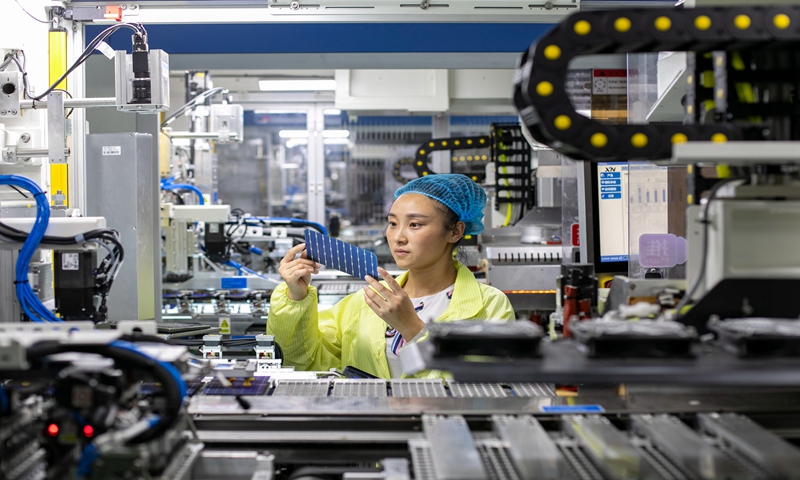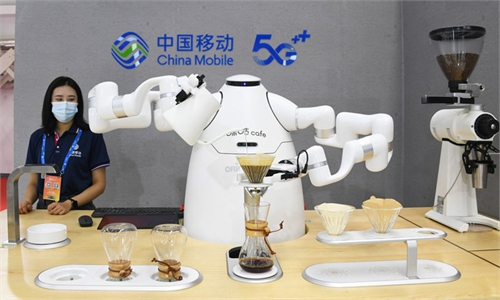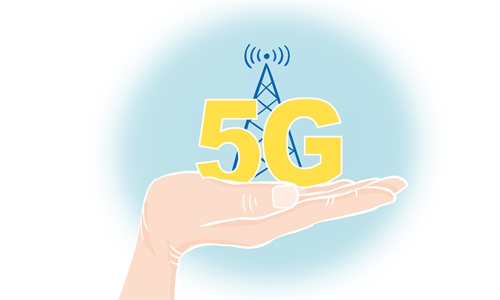Chinese firms to put on strong show at MWC 2022, indicating focus on European market
Tech giants’ enthusiasm underlines importance of European market

A worker makes photovoltaic solar modules for export at a 5G plus smart workshop in Nantong, East China's Jiangsu Province on October 20, 2021. The workshop was built by the new-energy unit of Jiangsu Focus Group in 2020 to realize equipment and data interconnection through 5G technology, which improves production and efficiency. Photo: VCG
About 50 Chinese companies, including telecom giants Huawei and ZTE, will attend the Mobile World Congress 2022 (MWC 2022) that kicks off on Monday in Barcelona, Spain, aiming to showcase cutting-edge technologies and new devices, as Europe is still viewed as a significant market for Chinese technology giants despite rising geopolitical uncertainties.
The four-day event will be two to three times larger than in 2021, with registered attendees coming from 2,000 companies and 183 countries and regions, and with 50 percent at director level or above, according to the MWC's official website. The event was canceled in 2020 due to the COVID-19 pandemic.
This year, many of the global big names in mobile tech will return with a physical presence. Notably, Chinese companies, including Lenovo, Huawei, ZTE, Oppo and Xiaomi, will have a strong presence, bringing a range of products and latest technologies in an effort to impress local consumers, the Global Times learned.
Huawei, which has encountered major setbacks in the European market in recent years, will launch a series of new products during the event, indicating its aim of sticking to the continent. Honor, once Huawei's smartphone subsidiary but now an independent brand, will bring its new handset Magic 4 series to European consumers during the event.
Though not revealing what it may launch at the event, Lenovo said in a statement it sent to the Global Times on Sunday that at MWC 2022, Lenovo aims to create a more connected and increasingly hybrid world that increases productivity in the digital age and empowers the intelligent transformation of people.
Smartphone maker Oppo said in a statement to the Global Times that it will showcase its new connectivity product, record-breaking mobile technologies, research and development achievements in augmented reality (AR) and 5G, and several high-end flagship products during the event.
The Shenzhen-based company will set up five major exhibition areas at its booth - "Brand", "Flagship", "Smartphone Technology", "5G" and "AR Ecosystem." It will also create a virtual playground for tech enthusiasts around the world.
For Chinese enterprises, the MWC is still a very important platform for displaying products, communicating face-to-face with customers, and showing strength; Therefore, it can be seen that the participation of Chinese enterprises is still very high, and it also shows the importance of the European market to Chinese enterprises, Ma Jihua, a veteran industry analyst, told the Global Times on Sunday.
Observers said that the increasing Chinese participation also showed that the relentless efforts of the US to target Chinese tech companies had little impact on the industry structure, and cooperation prospects between Chinese and European firms remain large, especially in 5G, where China plays a leading role.
In November 2021, an official of China's Ministry of Industry and Information Technology (MIIT) said that the number of China's 5G users stood at 450 million, accounting for more than 80 percent of the estimated global user base.
Nearly 1.43 million 5G base stations were rolled out in the country, forming the world's largest 5G network and accounting for over 60 percent of the global total, according to the MIIT.
"Although some European countries are obviously affected by politics, there are also many European countries that care more about the development of their own digital economies," Huang Haifeng, a veteran industry analyst, told the Global Times on Sunday.
European telecom operators focus on business development, and they are still quietly expanding digital services such as 5G and cloud, Huang said.



